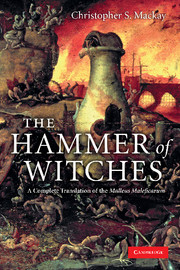Book contents
- Frontmatter
- Dedication
- Contents
- Map
- Introduction
- THE HAMMER OF WITCHES
- Structure of the text
- Author's Justification of the “Hammer for Sorceresses”
- Text of the Apostolic Bull
- Approbation and Signatures of the Doctors of the Illustrious University of Cologne
- PART I
- Question 1
- Question 2
- Question 3
- Question 4
- Question 5
- Question 6
- Question 7
- Question 8
- Question 9
- Question 10
- Question 11
- Question 12
- Question 13
- Question 14
- Question 15
- Question 16
- Question 17
- Question 18
- PART II
Question 3
from PART I
Published online by Cambridge University Press: 05 August 2015
- Frontmatter
- Dedication
- Contents
- Map
- Introduction
- THE HAMMER OF WITCHES
- Structure of the text
- Author's Justification of the “Hammer for Sorceresses”
- Text of the Apostolic Bull
- Approbation and Signatures of the Doctors of the Illustrious University of Cologne
- PART I
- Question 1
- Question 2
- Question 3
- Question 4
- Question 5
- Question 6
- Question 7
- Question 8
- Question 9
- Question 10
- Question 11
- Question 12
- Question 13
- Question 14
- Question 15
- Question 16
- Question 17
- Question 18
- PART II
Summary
[TT] AS for the first point, it seems that it is not a Catholic proposition to claim that humans can be begotten by incubus and succubus demons.
[AG 1] The begetting of humans was instituted by God before the introduction of sin, in that he shaped woman as an aid for man from his rib. To them He said, “Grow and increase in number” (Gen. 1[:28]) and again with inspiration Adam said, “There will be two in one flesh” (Gen. 3 [actually, 2:24]). Similarly, under natural law after the introduction of sin Noah was told, “grow and increase in number” (Gen. 9[:1]). In the period of the New Law, too, this union was confirmed by Christ (“Did you not read that from the beginning He who made humans made them male and female?” (Matt. 19[:4])). Therefore, other methods of begetting humans should not be posited.
If it is said that demons co-operate not as a natural but as an artificial origin when they contribute to natural conception by taking the seed of humans | and later pouring it in, the contrary is so, because the Devil would have this virtue either in connection with any status, whether within marriage or outside it, or only in one. The first is not so, because in that case the work of the Devil would be stronger than that of God, Who instituted or confirmed every status (for instance that of the celibate and the married). The second is also not so, because nothing can be read in the Scriptures about humans of one status and not the other being begotten in this way.
[AG 2] Also, to beget a human is the act of a living body, but demons cannot give life when they have assumed bodies, because life flows in a formal sense only from the soul, and this is the act of a physical, organic body that has the power of life ([Aristotle] The Soul, Bk. 2 [2.4]). Therefore, they cannot perform the works characteristic of life through such assumed bodies.
- Type
- Chapter
- Information
- The Hammer of WitchesA Complete Translation of the Malleus Maleficarum, pp. 121 - 133Publisher: Cambridge University PressPrint publication year: 2009



